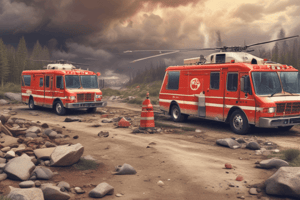Podcast
Questions and Answers
What is the primary goal of recovery phase after a disaster?
What is the primary goal of recovery phase after a disaster?
- To provide temporary shelter and food
- To decrease the vulnerability of society to future events
- To help people restore their lives and infrastructure (correct)
- To reduce the risk of future occurrence
What is the main role of a doctor in disaster response?
What is the main role of a doctor in disaster response?
- To assist in all phases depending on job schedule (correct)
- To provide public education
- To triage patients
- To maximize impact with given resources
What is the effect of disaster on health services?
What is the effect of disaster on health services?
- Improvement in health services
- Increase in health services
- Strain on health services (correct)
- No impact on health services
What is triage in the context of disaster response?
What is triage in the context of disaster response?
What is the purpose of primary prevention?
What is the purpose of primary prevention?
What is the classification of patients who require immediate medical care in triage?
What is the classification of patients who require immediate medical care in triage?
What is the purpose of application of triage in a prehospital setting?
What is the purpose of application of triage in a prehospital setting?
What is the main goal of disaster response?
What is the main goal of disaster response?
What is the outcome of a system that fails to plan?
What is the outcome of a system that fails to plan?
What is the main cause of man-made disasters?
What is the main cause of man-made disasters?
Flashcards are hidden until you start studying
Study Notes
Disaster Management
- A disaster is an event that results in casualties that overwhelm the healthcare system in which the event occurs.
Types of Disasters
- Natural disasters: earthquakes, cyclones, hurricanes, floods, landslides
- Human-made disasters: motor vehicular accidents, communal clashes, herdsmen attacks, oil spillage, suicide bombing
Hazard and Risk
- Hazard: possibility of being open to injury or misfortune
- Risk: probability of a hazard triggering a disaster
Disaster Management Components
- Preparedness: measures taken before a disaster to reduce damage
- Response: instant assistance to maintain life, improve health, and hold up morale
- Recovery: helping people restore their lives and infrastructure
Disaster Management Plan
- A planned and systematic approach to minimize the effect of disasters
- Must be multi-sectoral, realistic, and easily adoptable
- Clear roles and responsibilities for different agencies
- Rehearsal and evaluation are essential
Hospital Disaster Plan
- Prepared to reduce pressure on hospital management during a large number of casualties
- Requires immediate activation to provide efficient care
- Periodic mock drills to acquaint staff with the plan
- Disaster SOP must be kept in the casualty department
Mitigation
- Goal is to reduce the probability of a disaster occurring
- Public education and preventive health measures can mitigate the effect of unavoidable disasters
Roles and Duties of a Doctor
- Assist in all phases of disaster management
- Public education
- Maximize impact with given resources, triage
Mass Casualty
- A mass casualty occurs when the health facility is unable to cope with the number and/or types of casualties
- Triage is essential in mass casualty situations
- Classifications in triage: immediate medical care, delayed care, not urgent or minor, and dead or near dead
Effects of Disaster
- Increase demand for medical attention
- Mass casualty
- Population displacement
- Strain on health services
Studying That Suits You
Use AI to generate personalized quizzes and flashcards to suit your learning preferences.




